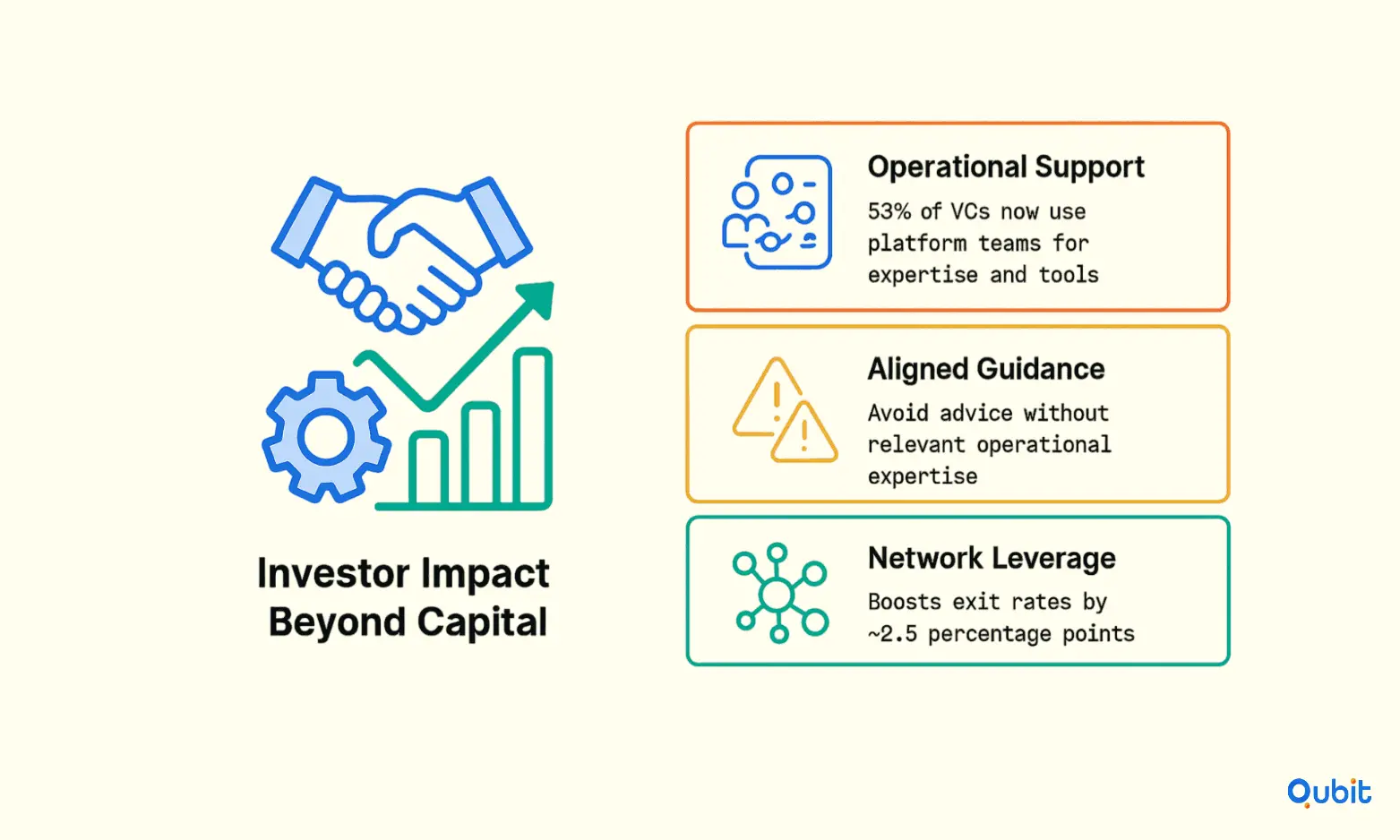Investors play a pivotal role in shaping the trajectory of startups, but their impact extends far beyond financial contributions. The most successful investor-startup partnerships are built on strategic involvement, where investors actively contribute expertise, networks, and mentorship to accelerate growth. This blog explores the tangible ways investors can create meaningful value for startups, ensuring mutual success.
Your strategic planning finds a broader framework in how to do startup outreach for investors, a resource that outlines various channels and tactics to engage with startups.
From fostering innovation to guiding operational strategies, the potential for investor influence is immense. Let’s jump right in to uncover how strategic involvement can transform startups into thriving businesses.
Investor Impact: How Value Beyond Capital Fuels Startup Growth
The role of investors in startup success has evolved significantly over the years. While capital remains essential, the modern investor brings far more to the table. For example, 53% of VCs now utilize platform teams to provide operational support and resources, a figure that has more than doubled since 2000. These teams offer startups access to expertise, networks, and tools that can accelerate growth beyond financial backing.

However, founders must tread carefully when implementing directives from investors. A cautionary trend highlights that following advice from investors lacking direct operational expertise can derail critical execution tasks. This underscores the importance of aligning investor input with the startup’s strategic goals.
Well-networked investors also play a pivotal role in boosting exit rates, improving them by approximately 2.5 percentage points. Their connections and insights can open doors to partnerships, acquisitions, and other opportunities that drive portfolio company growth.
The shift from capital-only contributions to value-added roles reflects the changing dynamics of venture capital. Investors who offer operational guidance, mentorship, and access to networks are increasingly seen as catalysts for sustainable growth.
Utilizing Networks for Startup Acceleration
Building a strong network is often the cornerstone of a startup’s success. For founders, connections can open doors to investors, customers, and industry experts who can provide invaluable guidance. However, the true power of a network lies in how effectively it is utilized.
One way to maximize the impact of connections is by using tools like Task Pigeon, a web application designed to streamline daily tasks. For instance, founders can use Task Pigeon to create structured follow-ups after investor introductions, ensuring no opportunity is missed. This level of organization can transform casual connections into meaningful partnerships.
Another critical aspect of network utilization is learning from the experiences of others. Resources like First Round Review offer actionable advice on go-to-market strategies, hiring, and scaling. By referencing insights from this blog, startup leaders can better understand how to turn their networks into strategic assets.
Investors also play a pivotal role in helping startups grow. They often introduce founders to potential customers, partners, and even key hires. For those looking to refine their approach to investor introductions, our investor-outreach-email-template provides structured examples of effective communication. This resource can help investors craft introductions that resonate and lead to tangible outcomes.
Ultimately, the key to accelerating a startup’s growth lies in identifying operational gaps and using the right connections to fill them. Whether it’s through strategic introductions or leveraging tools to streamline processes, a well-utilized network can be a game-changer.
Fostering Strategic Alliances: Cultivating Key Partnerships
Strong partnerships are the cornerstone of success in the investment ecosystem. Building strategic alliances with co-investors, founders, and other financial stakeholders not only enhances deal flow but also creates opportunities for follow-on investments. These relationships thrive on mutual trust, shared goals, and a commitment to long-term collaboration.
1. The Value of Warm Introductions
Warm introductions often serve as the gateway to meaningful partnerships. They provide a foundation of credibility, making it easier to establish rapport with potential collaborators. Whether connecting with founders or other investors, these introductions can accelerate the process of identifying shared objectives and aligning strategies.
2. Strengthening Relationships Through Collaboration
Collaborative partnerships are essential for navigating the complexities of investment opportunities. By pooling resources and expertise, co-investors can mitigate risks and maximize returns. These alliances also foster a sense of community, where stakeholders work together to achieve mutual success.
3. Establishing Credibility Through Thought Leadership
Credibility is a critical factor in cultivating impactful relationships. An analysis of reputation building appears in investor-thought-leadership, which demonstrates how thought leadership contributes to establishing a credible presence with founders. By positioning yourself as a trusted expert, you can attract like-minded partners who value your insights and expertise.
Strategic alliances are not built overnight; they require consistent effort and a genuine commitment to mutual growth. By focusing on trust, collaboration, and credibility, investors can create partnerships that drive long-term success.
Industry Expertise for Strategic Growth
Industry expertise can be a game-changer for startups aiming to scale strategically. Investors who bring specialized knowledge to the table often provide more than just capital, they offer actionable insights that address critical gaps in leadership, product development, and market alignment.
Enhancing Product-Market Fit Through Design Support
Google Ventures exemplifies how industry-specific expertise can refine a startup’s trajectory. By offering an in-house design team and employing its renowned Design Sprint process, Google Ventures has helped startups like Nest, Slack, and Uber optimize their user experiences. This hands-on approach ensures that products resonate with their target audiences, ultimately improving product-market fit. The integration of design expertise not only accelerates development cycles but also minimizes costly missteps during the early stages of growth.
Building Leadership Teams with Executive Networking
Greylock Partners takes a different yet equally impactful approach by addressing leadership gaps within its portfolio companies. Through the efforts of an Executive Talent Partner, Greylock connects startups with senior executives who bring domain-specific expertise. This strategy has been instrumental in building world-class leadership teams and boards, enabling startups to navigate complex challenges with seasoned guidance. By bridging these gaps, Greylock ensures that its portfolio companies are equipped to make informed decisions and scale sustainably.
For a deeper dive into fostering strong investor-founder relationships, explore insights on how to build investor-founder relationships. This resource highlights nuanced strategies for nurturing lasting connections that drive mutual success.
Investors with domain-specific expertise are not just financial backers—they are strategic partners who help startups overcome hurdles, align with market trends, and achieve sustainable growth.
Driving Performance: Operational Expertise in Investor Strategy
Operational expertise has emerged as a defining factor in the competitive world of venture capital. Modern investors are no longer just providers of capital; they are becoming strategic partners who actively contribute to the growth and success of startups. This shift is evident in the increasing adoption of value-add services, with 53% of venture capital firms now employing dedicated platform teams to support their portfolio companies.
These platform teams focus on addressing critical challenges startups face, such as financial management, marketing, and scaling operations. By offering tailored guidance, investors help founders optimize processes and track performance more effectively. For instance, startups often struggle with scaling their operations efficiently. Here, operational expertise can streamline workflows, ensuring resources are allocated where they matter most.
This trend toward value-add services is reshaping the venture capital landscape. Investors who provide hands-on support are positioning themselves as indispensable partners, differentiating their offerings in a crowded market. As startups increasingly seek not just funding but also strategic guidance, this approach has become a key differentiator among modern VCs.
Operational expertise also plays a pivotal role in fostering long-term success. By addressing pain points early, investors can help startups build a solid foundation for sustainable growth. Whether it’s refining go-to-market strategies or implementing robust financial controls, the impact of this expertise is measurable and transformative.
To thrive in this evolving environment, both investors and startups must embrace the value of operational support. This collaboration not only drives performance but also creates a lasting competitive edge.
Facilitating Soft Landings: Strategic Exits and Restructuring Support
When startups face underperformance, the path forward often requires careful planning to preserve value and relationships. Strategic exits and restructuring support offer a way to achieve this through methods like acquihires, intellectual property (IP) sales, or other tailored solutions. These approaches ensure that even in challenging times, businesses can transition smoothly while safeguarding their core assets.
The Role of Acquihires and IP Sales
Acquihires have become a popular strategy for startups looking to secure a "soft landing." This process involves transferring the startup’s team to a larger company, ensuring that talent is retained while the acquiring company benefits from their expertise. Similarly, selling intellectual property provides an opportunity to monetize valuable assets, such as patents or proprietary technology, which may not have reached their full potential within the startup. Both strategies allow founders to close one chapter while creating opportunities for growth elsewhere.
Strategic Investor Initiatives
Investors play a critical role in facilitating these transitions. By offering guidance and resources, they help startups identify the most viable exit strategies. This could involve connecting founders with potential buyers, negotiating terms, or providing financial support during the restructuring process. These efforts not only preserve the startup’s value but also maintain trust and goodwill among stakeholders.
Why Soft Landings Matter
A well-executed soft landing minimizes disruption for employees, investors, and customers. It ensures that the startup’s legacy, whether in the form of talent, technology, or partnerships—continues to create value. More importantly, it reflects a commitment to responsible business practices, even in the face of adversity.
Strategic exits and restructuring are not just about closing doors; they’re about opening new ones. By focusing on solutions that benefit all parties, startups can transition with dignity and purpose.
Diverse Growth Strategies: Explore Key Topics for Startup Success
Startups thrive on adaptability and innovation, but achieving sustainable growth requires a clear focus on diverse strategies. From refining sales tactics to optimizing IT services, founders must address multiple aspects of their business to ensure success.
One critical area often overlooked is administrative efficiency. Services like ZenBusiness, which boasts an "Excellent" rating on Trustpilot with 23,728 reviews and a stellar 4.8 out of 5 stars, can streamline essential tasks. By utilizing a well-reviewed platform, founders can free up time to concentrate on scaling their operations.
Sales and marketing strategies also play a pivotal role in startup success. Whether it's adopting data-driven campaigns or exploring new customer acquisition channels, these efforts directly impact revenue generation. Similarly, human resources and IT services are foundational to scaling operations effectively. Building a robust team and ensuring technological infrastructure are key to maintaining momentum as your startup grows.
By exploring curated resources and expert insights, founders can uncover actionable strategies tailored to their unique challenges. Diverse growth strategies empower startups to not only survive but thrive in competitive markets.
Transcript Excerpts: Insights from Industry Leaders
The perspectives shared by industry leaders often provide a roadmap for navigating complex business challenges. In a recent discussion, Enrico Ferrari emphasized the importance of building operational value within organizations. His insights, accessible through Enrico Ferrari’s LinkedIn, highlight strategies for aligning operational frameworks with long-term goals.
Marco Antônio Ferreira Birck brought a unique angle to the conversation, focusing on the potential of cross-market partnerships. His commentary, which you can explore further on Marco Antônio Ferreira Birck’s LinkedIn, underscores the need for collaboration across industries to unlock new opportunities.
Adding to the dialogue, Russ Wilcox shared actionable strategies for performance tracking and operational expertise. His examples, detailed on Russ Wilcox’s LinkedIn, serve as a guide for businesses aiming to refine their processes and achieve measurable results.
Vinod Khosla’s bold claims also sparked significant discussion. He stated that “90% of investors add no value” and went further to assert that “70% of investors add negative value to a company.” These statistics highlight the critical importance of selecting investors who contribute positively to a company’s growth and vision.
These excerpts collectively offer a wealth of knowledge, emphasizing the value of operational excellence, strategic partnerships, and discerning investor relationships in driving success.
Conclusion
Investors bring more than just financial backing to the table. Their contributions can include industry expertise, operational guidance, and access to valuable networks, all of which are critical for driving startup growth. Building strategic alliances and fostering a collaborative environment with investors can also create opportunities for long-term success. By focusing on these strategies, startups can ensure a smoother path to scaling and achieving their goals.
Adopting a value-driven investor approach is essential for any startup aiming to thrive in competitive markets. This mindset not only fuels growth but also strengthens the foundation for sustainable success.
If you're looking to connect with investors who align with your vision, we at Qubit Capital can assist. Explore our Investor Discovery and Mapping service to identify strategic partners tailored to your needs.
Key takeaways
- Investors add critical value beyond funding by offering strategic guidance and operational expertise.
- Leveraging professional networks creates new opportunities for startup growth.
- Collaborative relationships and thought leadership enhance deal flow and credibility.
- Industry-specific insights help startups navigate market and regulatory challenges.
- Supportive strategies like soft landings preserve value during downturns.
Frequently asked Questions
What value do investors bring to startups?
Investors offer not only capital but also strategic guidance, mentorship, and access to networks that can significantly accelerate startup growth.






